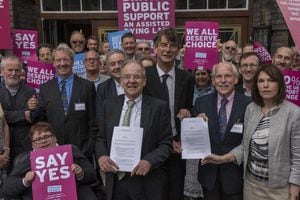Wolverhampton South West MP Rob Marris: I am promoting choice - not death
The MP proposing to legalise assisted dying is defending himself against the insinuation by religious leaders that he is 'promoting death'.

Rob Marris, MP for Wolverhampton South West, responds today to an open letter signed by 36 church and other religious professionals from Wolverhampton and the West Midlands and says his opponents are misrepresenting his Private Members' Bill, due to be debated in the Commons next Friday:
"I refer to the open letter from religious professionals to me, published in the Express & Star.
It is in response to my article which the Express & Star published, setting out my reasons for proposing this legislation.
I have no wish to enter into a tit-for-tat on this issue. However, a few comments might illuminate matters.
As a politician, of course I have no problem with people criticising me for proposals I make. I do object to people criticising me for proposals which I have never made.
In particular, I do object to the comment 'promote death in order to encourage life', when I am not promoting death.
What I am promoting is choice, a choice that the authors would for their own deeply held faith reasons, deny all terminally ill adults of sound mind.
It is disappointing that these opponents of the bill continue to misrepresent that which I propose.
In the case of the open letter, that misrepresentation starts as soon as the first line. The authors say that my bill 'proposes to allow doctors to prescribe and administer drugs to prematurely end life'.
It does not. It would only be the patient, and no-one else, who administers such drugs.

This is not a minor quibble. It is a major difference, as the open letter authors well know. They want people to think that I am proposing euthanasia; hence their repeated use of the word in their letter. To allow doctors to administer fatal drugs is indeed euthanasia, but I am not proposing that.
They say that 'an assisted suicide is not a more dignified end to life than one which has taken its natural course'. In some circumstances, I do believe that assisted dying is more dignified. It allows a terminally ill adult of sound mind to end their own life, in their own home, surrounded by their loved ones, escaping from intolerable pain – whereas at the moment some such patients are killing themselves in most undignified circumstances; and others are dying in pain they do no longer wish to experience.
On protection, the authors again suggest that my bill would allow someone to 'take away' a patient's life. As those authors know full well, the bill does not propose that.
The authors are quite right that 'hard cases make bad law'. That is precisely the problem we have now. In the absence of clear law from Parliament, the Director of Public Prosecutions is freelancing on which cases of assisted death get prosecuted and what don't.
The open letter says that my bill is opposed by every disability group in the country. Disability has nothing to do with this bill, because disability is of course not an illness let alone a terminal one.
In fact, opinion polls suggest that about 80 per cent of people with disabilities are in favour of this legislation, which is the same as the population as a whole.
The authors are concerned about what they term 'treatment creep'. Before the Suicide Act 1961, it was illegal for someone to try to kill themselves. Section 2 of that Act provides for 'criminal liability for complicity in another's suicide'. My bill proposes to change that provision, in very restricted circumstances. Guess what? Such a change needs a change in the law; hence my bill. There will be no 'creep' in the Assisted Dying Act, although – as with anything – there could be new legislation.
A prognosis of life expectancy for an ill patient is the professional opinion of a doctor, based on the 'balance of probabilities'. As long as a patient is aware of this basis, the fact that the prognosis may be inaccurate is a red herring. It is merely one factor for the patient to consider when deciding what course of action they might or might not take.
It is astonishing for some to suggest that the introduction of assisted dying will worsen palliative care, not least because the evidence from the European Association of Palliative Care (report, 2011) is that there is no connection between the availability, or not, of assisted dying and the level of palliative care.
The ministers say that 'we will all die, but our role is not to shorten life but protect it for its duration'. I do understand this spiritual view, but I do find it hard to reconcile that view with the fact that most religions, and most of their adherents, are not pacifists.
I do understand that some people of faith feel very deeply that ending one's own life is in all circumstances wrong. Nevertheless, the depth and sincerity of their view should not mean that they deny choice to those of us who do not share their views.





